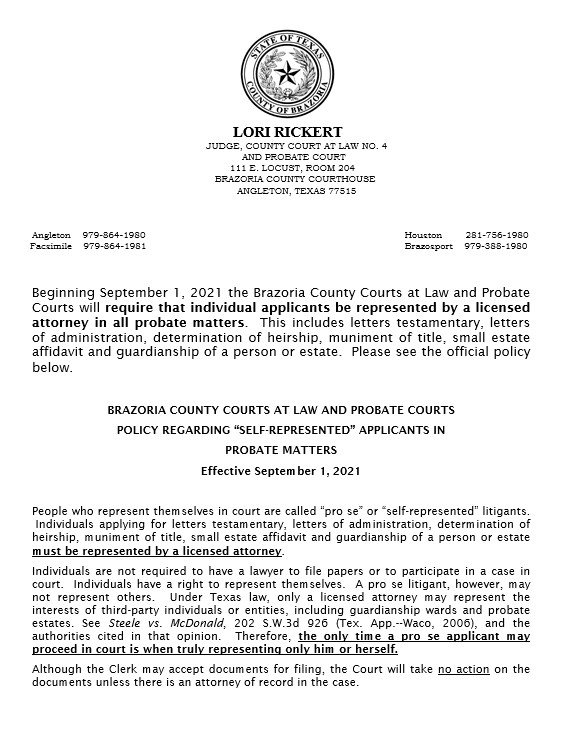From:
LORI RICKERT, JUDGE, COUNTY COURT AT LAW NO. 4 AND PROBATE COURT
Beginning September 1, 2021 the Brazoria County Courts at Law and Probate Courts will require that individual applicants be represented by a licensed attorney in all probate matters. This includes letters testamentary, letters of administration, determination of heirship, muniment of title, small estate affidavit and guardianship of a person or estate. Please see the official policy below.
BRAZORIA COUNTY COURTS AT LAW AND PROBATE COURTS POLICY REGARDING “SELF-REPRESENTED” APPLICANTS IN PROBATE MATTERS–Effective September 1, 2021
People who represent themselves in court are called “pro se” or “self-represented” litigants. Individuals applying for letters testamentary, letters of administration, determination of heirship, muniment of title, small estate affidavit and guardianship of a person or estate must be represented by a licensed attorney.
Individuals are not required to have a lawyer to file papers or to participate in a case in court. Individuals have a right to represent themselves. A pro se litigant, however, may not represent others. Under Texas law, only a licensed attorney may represent the interests of third-party individuals or entities, including guardianship wards and probate estates. See Steele vs. McDonald, 202 S.W.3d 926 (Tex. App.–Waco, 2006), and the authorities cited in that opinion. Therefore, the only time a pro se applicant may proceed in court is when truly representing only him or herself.
Although the Clerk may accept documents for filing, the Court will take no action on the documents unless there is an attorney of record in the case.
FREQUENTLY ASKED QUESTIONS:
Q: What is a pro se?
A: A pro se is an individual who has not hired a lawyer and appears in court to represent himself and no other person or entity.
Q: Can I still serve as an executor, administrator, or guardian even though I’m not a lawyer?
A: Yes. One need not be a lawyer to serve as an executor, administrator, or guardian. However, the executor, administrator, or guardian must be represented by counsel.
Q: I’m the only one that needs letters testamentary. As executor, how would I be representing the interest of others?
A: As executor of a decedent’s estate, you don’t represent only yourself. An executor represents the interest of beneficiaries and creditors. This responsibility to act for the benefit of another is known as a fiduciary relationship. It gives rise to certain legal obligations and responsibilities that require legal expertise. The attorney you hire represents you in your capacity as executor and assists you in representing those for whom you are responsible.
Q: If I get the paperwork from a law library or the internet, can I fill it out and file it? Isn’t that what lawyers do?
A: Lawyers don’t just fill out forms. Lawyers (1) determine what method of probate or guardianship is appropriate in a particular situation, (2) create or adapt any necessary paperwork, and (3) advise the client about the ongoing responsibilities of a fiduciary. Unless you are a lawyer, creating legal pleadings while acting as a fiduciary would constitute the unauthorized practice of law.


